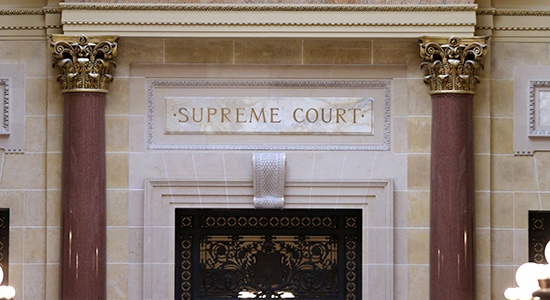
Sept. 6, 2016 – The Wisconsin Supreme Court kicked off the 2016-17 term this morning with an oral argument in which the defendant argued that police violated his constitutional rights by entering his garage without a warrant, leading to his arrest.
Before argument began in State v. Weber, Chief Justice Patience Roggensack introduced the newest member of the court, Justice Daniel Kelly. Kelly, a former private practitioner in Waukesha, replaced Justice David Prosser, who retired this summer.
The chief justice also introduced herself and the other five justices on the seven-member court. Then the state proceeded with the first argument of the session.
“This case is not about a bad brake light,” said Assistant Attorney General Nancy Noet. “The only relevance that brake light has is that it gave the deputy lawful authority to command the stop. When Mr. Weber didn’t stop, everything else unfolded.”
A police officer activated emergency lights to stop Richard Weber for a broken brake light. But Weber’s home was approximately 100 yards away, according to the officer.
Weber did not stop. He continued, drove into his driveway and into his garage, which was attached to the house. The officer exited the squad car and asked Weber to come talk.
Weber ignored the request and was headed up the garage steps leading to the doorway into his home. The officer entered the garage, a protected area, and prevented Weber from entering the house. Ultimately, the officer arrested Weber for drunk driving.
Weber challenged the arrest, arguing that the officer violated his Fourth Amendment right against unreasonable searches and seizures by entering the garage without a warrant. The circuit court denied the motion and he pleaded no contest, then appealed.
A state appeals court reversed, concluding that the police officer did not have a justifiable reason to enter the garage without a warrant. The state appealed, arguing that police had probable cause to arrest him for the brake light and for failing to stop.
Justice Shirley Abrahamson asked how much time elapsed between the time the officer activated his emergency lights and the moment Weber pulled into his driveway.
The record did not state, Assistant Attorney General Nancy Noet noted. “But I don’t think it matters,” she said. “You look at the totality of the circumstances and you decide whether the deputy had reason to believe that Mr. Weber was fleeing a traffic stop.”
Then Justice Kelly asked his first question as a sitting justice in oral argument: “Is it your position that it is only fleeing the traffic stop that warranted the seizure?”
Noet said it was “one continuous pursuit” that began when the officer activated the lights and ended when the officer seized Weber. “But as the stop evolves, does that potentially give you greater authority to seize without a warrant?” Kelly asked.
“Absolutely,” Noet responded. “At what point did it become appropriate for the officer to seize Weber without a warrant?” Justice Kelly inquired. Noet said the officer had authority once the officer had reasonable cause to believe Weber committed a jailable offense, and Weber committed a jailable offense when he failed to stop on the road.
The state argued for a per se rule that hot or immediate pursuit of a suspect, based on probable cause that the suspect committed a jailable offense, justifies warrantless entry into the home. Under that rule, Noet argued, the officer’s warrantless entry was justified.
“Suspects can’t be encouraged to run from the police and take refuge in a private place,” Noet said.
Public defender Kara Mele, representing Weber, said the only exception to the warrant requirement involves an exigent circumstance. That is, police need a warrant unless they fear for someone’s safety or there is danger that evidence will be destroyed if police wait to get a warrant. Mele said police had no exigent circumstance here.
Justice Abrahamson raised concern that police could turn a non-jailable offense (defective brake light) into a jailable offense (fleeing police) in order to gain entry into constitutionally protected areas even when the alleged “flee” involves a short distance.
Mele agreed. “The officer must point to some facts that demonstrate the driver was actually fleeing,” Mele noted. “Hot pursuit could create an exigency, but the ultimate test is whether there is a compelling need to act and no time to get a warrant.”
Mele said the state is asking for a per se exigency, based on hot or immediate pursuit, that is not permissible under a totality of the circumstances analysis. “When we start limiting the factors a court can consider in assessing reasonableness, we run the risk of insulating constitutional violations from judicial review. This case is a perfect example.”
Although Justice David Prosser is now retired, the parties and the justices invoked a relevant concurrence that he wrote in 2008 regarding home entries in hot pursuit cases.
Prosser had argued, in State v. Sanders, 2008 WI 85, that an “[e]ntry into a home in hot pursuit to arrest a person on probable cause for a jailable criminal offense is a longstanding, common sense exception to the warrant requirement.”
